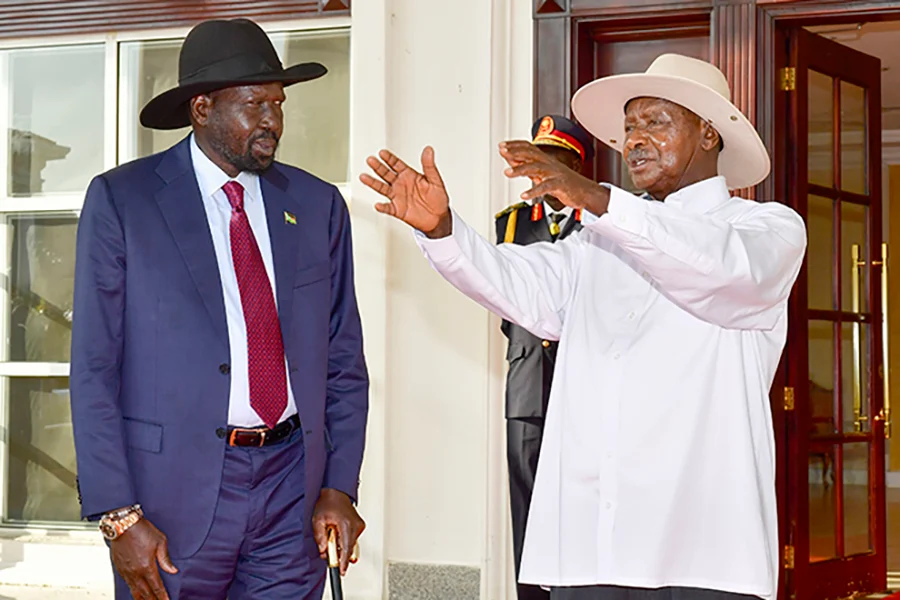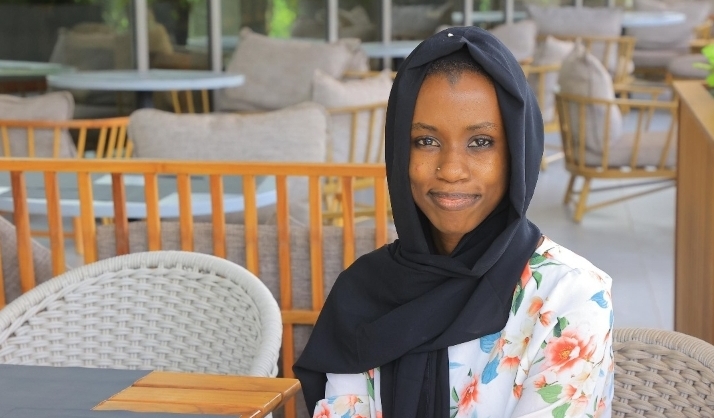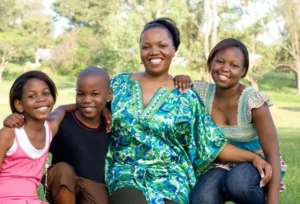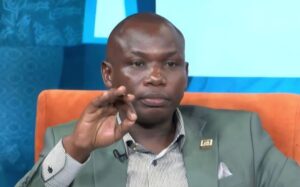News
President Museveni Set for High-Stakes Visit to South Sudan

President Museveni is expected to travel to South Sudan tomorrow for a crucial meeting with President Salva Kiir, amid escalating political and security tensions in the country.
While the State House remains tight-lipped about the details of the visit, reliable sources confirm that the Ugandan leader will be in Juba on Friday.
Separately, the presidential press secretary Sandor Walusimbi confirmed to the Nile Post that the head of state had left for the restive youngest nation in the world.
Museveni’s visit comes at a time when South Sudan is facing severe turmoil due to internal conflicts within Kiir’s government.
President Kiir has recently fallen out with his First Vice President Riek Machar, leading to the latter and his wife Angelina Teny being placed under house arrest.
The deepening crisis threatens to unravel the fragile peace agreement that ended the country’s bloody civil war (2013-2018), during which Kiir’s forces, predominantly ethnic Dinka, clashed with Machar’s largely Nuer forces.
President Museveni’s visit is expected to focus on de-escalating tensions and seeking a resolution to the current political impasse.
Our sources revealed that Museveni will push for a renewed dialogue between Kiir and Machar, as well as address concerns over Uganda’s military presence in South Sudan.
However, given the deep-seated animosity between the two leaders, it remains uncertain whether Museveni’s intervention will yield any meaningful progress
Last week, Raila Odinga, the African Union’s High Representative for Infrastructure Development who doubles as Kenyan President William Ruto’s Special Envoy for South Sudan, visited Juba in an attempt to mediate between Kiir and Machar.
However, his efforts failed after he was denied a meeting with Machar. Odinga would travel back home via Entebbe for a meeting with Museveni.
He claimed that he had been asked by the Kiir government to seek permission from Museveni if he was to meet Machar, an allegation the South Sudan presidency has since strongly disputed.
The fallout between Kiir and Machar has been exacerbated by disputes over the peace implementation process, security force control, and the allocation of government positions.
Tensions escalated further last month when Uganda deployed its elite forces into South Sudan, a move that sparked criticism from Machar and his allies.
Machar has accused Uganda of violating international agreements by deploying troops and launching airstrikes against civilian targets in Upper Nile and Jonglei states.
In a letter to UN Secretary-General António Guterres, Machar called for the immediate withdrawal of Ugandan forces, arguing that their presence undermines South Sudan’s transition to democracy and threatens to reignite conflict.
In early March, Kiir ordered the arrest of several senior officials linked to Machar, including Petroleum Minister Puot Kang Chol and Deputy Army Chief Gabriel Doup Lam. Other military officials allied with Machar have been placed under house arrest.
The crackdown followed violent clashes in Nasir, a strategic northern town, where government forces battled the White Army militia—an armed Nuer group that fought alongside Machar’s forces during the civil war.
Tensions further escalated on March 7, when an attack on a military base in Nasir County resulted in the death of General Majur Dak Thel and several officers. President Kiir blamed Machar’s forces for the attack, further deepening the rift.
The situation worsened when Uganda’s Chief of Defence Forces, General Muhoozi Kainerugaba, confirmed the deployment of Ugandan commandos into South Sudan under the operation code-named ‘Mlinzi wa Kimya.’
In a social media post, Gen. Muhoozi praised the Ugandan Air Force for striking enemy positions, confirming Uganda’s active military engagement in South Sudan.
Machar has urged the African Union, the Intergovernmental Authority on Development (IGAD), and the United Nations Security Council to intervene and pressure Uganda to withdraw its troops.
He argues that Uganda’s military presence violates UN Security Council Resolution 2428 (2018), which imposed an arms embargo on South Sudan and was recently extended by Resolution 2731 (2024).
The government, however, has historically defended its military interventions in South Sudan as necessary to maintain regional stability.
Uganda played a key role in supporting Kiir’s government during the 2013-2018 civil war, deploying troops to prevent the capital, Juba, from falling to Machar’s forces.
As the situation in South Sudan continues to deteriorate, the outcome of Museveni’s visit could have significant implications for the region’s stability.
The international community will be closely watching the developments in Juba, hoping for a peaceful resolution to prevent another outbreak of violence in Africa’s youngest nation.
News
Conversation With Uganda’s Student Tech Pioneer: Kusiima Saruah

In a country where the youth make up the majority of the population, their voices are often overlooked in critical governance processes. But a bold new wave of innovation led by young minds is reshaping how civic participation and leadership are cultivated, starting right at the grassroots.
One such trailblazer is Kusiima Saruah Kyaligonza, a 21-year-old software developer and university student at Uganda Martyrs University, whose work caught our attention. In a recent conversation with Amiri Wabusimba, Kusiima shared her vision, journey, and the powerful potential of digital platforms to transform Uganda’s democratic future.
Inspired by the challenges she observed in university elections, including voter mistrust, low student participation, and systemic apathy, Kusiima developed a digital voting platform tailored for student elections. She aimed to rebuild faith in electoral processes, beginning within schools. “Watching the university’s elections, I saw the frustration from students.
I wanted to create a space where students feel their voices matter and their votes count,” she explained. “If we instill that mindset early, we raise a generation that demands integrity and leads with purpose.” Her platform addresses specific electoral issues such as vote rigging, low turnout, and favoritism common even in student leadership contests by promoting transparency, fairness, and accessibility.
Kusiima’s work is part of a broader movement of youth-led innovation in Uganda. “We often say the youth are the leaders of tomorrow,” she noted, “but many of us are already leading today through art, technology, advocacy, and innovation. What we need is support, not just applause.” Her initiative has been well received by fellow students, who report feeling empowered, heard, and more engaged in school governance. According to Kusiima, the impact goes beyond elections; it sows seeds of responsible leadership.
Asked whether digital voting could work on a national level, Kusiima responded with conviction. “Yes, it can if we commit to building digital literacy, infrastructure, and, most importantly, trust. Leaders must stop fearing technology and start embracing its potential.” If given a chance to address the Electoral Commission or national leaders, Kusiima says she would urge them to invest in youth innovations and adopt transparent systems that simplify civic participation without compromising credibility.
As Uganda continues to grapple with questions around electoral transparency, declining public trust in democratic institutions, and low youth participation, innovations like Kusiima Saruah’s digital voting platform couldn’t have come at a better time, especially as the country prepares for the 2026 general elections. Her initiative offers more than a technological upgrade, it’s a catalyst for cultural change in how Uganda engages its citizens from an early age. By digitizing trust, simplifying participation, and empowering youth to lead, this platform embodies the future of accountable governance.
This is not just a student project; it’s a national opportunity waiting to be embraced. It is time for Uganda’s government, Electoral Commission, civil society, and development partners to see this for what it is: a smart, scalable, homegrown solution that reflects both the challenges and the aspirations of a new generation.
If Uganda truly seeks to uphold the principles of free and fair elections in 2026 and beyond, then supporting innovations like Kusiima’s is not optional; it is essential.
-
Top Stories2 days ago
Just in: PLU leaning to NRM, Withdraws From Party Primaries With 22 days Remaining to Elections.
-
Top Stories5 days ago
Suspected female suicide bomber killed in Kalerwe
-
Top Stories5 days ago
NUP Clears Kyeyune Pafuladiito For Mubende District Chairperson Race.
-
Top Stories5 days ago
NUP Goes For Buwekula South MP Seat Blesses Edward Ssempira.
-
Top Stories2 days ago
Museveni Approves Flyover Along Kampala-Jinja Highway to Protect Mbalala Industrial Park Workers
-
Top Stories4 days ago
Uganda’s Open Currency Policy and the Decline of the Shilling
-
Top Stories4 days ago
Dr. Ssemugenyi petitions Constitutional Court over UPDF Amendment Act
-
Top Stories2 days ago
Police fire teargas and water cannon at protesters in Kenya as thousands take to the streets

















